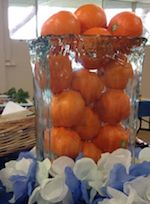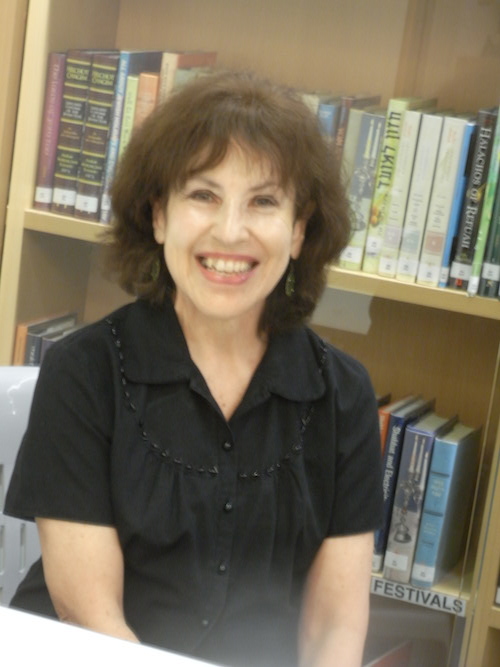 This week we will commemorate the 18th anniversary of Gimmel Tammuz, the day on which the Lubavitcher Rebbe moved on to a much higher plane of existence. Even after all these years, I cannot say “passed away”. I do not want to send the Rebbe away. I want him to remain part of my life - part of our lives. And although I may no longer be able to see him in body - something which leaves a gaping hole in my heart - I know that he is still here, guiding us in a very tangible way.
This week we will commemorate the 18th anniversary of Gimmel Tammuz, the day on which the Lubavitcher Rebbe moved on to a much higher plane of existence. Even after all these years, I cannot say “passed away”. I do not want to send the Rebbe away. I want him to remain part of my life - part of our lives. And although I may no longer be able to see him in body - something which leaves a gaping hole in my heart - I know that he is still here, guiding us in a very tangible way.
Our rabbis say that “Gedolim Tzaddikim b’misosom yoser m’b’chayehem” - “the righteous are greater after their passing than during their life times” - and this is certainly true of the Rebbe. Things that he spoke about many years ago, are only now being understood and appreciated.
One of the more difficult tasks one has as a Rabbi is verifying the Jewish status of couples who wish to marry. Often this is met with outright hostility. At other times great discomfort. After all, the person concerned is convinced that they are Jewish, was brought up Jewish, and therefore cannot understand what all the fuss is about.
From experience I can however say that it is not all that uncommon to find that a person who thought he or she was Jewish really is not. The situation can usually be rectified, but it does take time, and on occasion the wedding has to be postponed. This is one of the reasons that I insist on getting together all relevant documentation at the time of Bar/Bat Mitzvah. This way, no one needs to be unpleasantly surprised at the time of the wedding.
When looking at the Kesuvah of the parents of a bride some time ago, I was quite disturbed. I had assumed that this would be a relatively smooth case. There are however certain tell-tale signs when looking at a Kesuvah which immediately give away that the Rabbi who performed the marriage was either ignorant of halacha or not Orthodox. This was the case here.
When this occurs, it is often necessary to investigate a generation earlier - i.e. the grandparents of the bride and groom. And so we did.
Unfortunately no documentation was available from them either.
Finally, we received documentation concerning the maternal great- uncle, Bernard Benzion Weiner, together with a substantiating letter from his Rabbi, which was very convincing. It turns out that her great-uncle is a great talmid chacham who assists his rabbi by giving shiurim in their shule.
If it were up to me, this would have been sufficient. But the bride was going to get married in Israel - and the Israeli authorities were still not satisfied. Imagine the trauma of the bride!
In desperation, I asked her if she had any other documentation. She again wrote to her uncle who sent me a photocopy of a book in which there was a picture of her great-grandmother with a short story of her life.
Upon seeing the book, which I happen to have a copy of in my personal library, I was deeply moved. I immediately went over to Henya and placing the photo in front of her, I asked her whether she recognized the woman.
“Why, of course I do! She was a great friend of my Bobba Brocho and as a little girl I would see her in the home of Rebbetzin Chana (= the Rebbe’s mother)!”
It turns out that this lady, Chaya Soroh Weiner, was so highly regarded by the Lubavitcher Rebbe that he asked her to be the companion of his mother during the last years of her life, during which time she became her great friend. So much so that in the Rebbetzin’s biography there is a two page spread and a large photo of Chaya Soroh Weiner! It should be pointed out that in the entire book, which was personally edited by the Rebbe, Chaya Soroh Weiner is the only person to whom such an honour was given.
What a twist! Not only is the bride unquestionably Jewish, but it turns out that her great-grandmother is well- known to my Rebbetzin. Furthermore, the stories in the book demonstrate that she was a deeply pious woman, with an amazing strength of character, ready to give her life for Yiddishkeit!
And just for good measure, we soon found out that her great-uncle, Benzion Weiner, used to baby-sit for Henya and her sisters some forty years ago!
What a wonderful turn of events!
In the process of a rather uncomfortable investigation, we discover that the great-grandmother of the bride was not only a well-known personality but a uniquely pious and righteous woman!
It gets better still.
After a very emotional Shabbos in which the bride rediscovered her roots, she made contact with her great-uncle, Benzion Weiner, in New York.
Benzion then sent me another fax in which he related the following:
When the biography of the Rebbe was published, a special leather- bound volume was produced and presented to the Rebbe. As the Rebbe looked through the book, he noticed the name of Benzion Weiner, who was one of those who made the publication of the book possible.
The Rebbe then said to the woman who had presented him with the book:
“Der Zechus fun dem sefer vet em beishtein, un es veht amol tzunitz kumen” - “The merit of the book will support him and (the book) will be of use one day.”
“At the time,” continued Benzion, “I didn’t know what the Rebbe meant by ‘it will be of use one day’ ”
Now I know: “Der Rebbe hot gehat a veiten kuk” - “The Rebbe had far- reaching vision .””
 This week we will commemorate the 18th anniversary of Gimmel Tammuz, the day on which the Lubavitcher Rebbe moved on to a much higher plane of existence. Even after all these years, I cannot say “passed away”. I do not want to send the Rebbe away. I want him to remain part of my life - part of our lives. And although I may no longer be able to see him in body - something which leaves a gaping hole in my heart - I know that he is still here, guiding us in a very tangible way.
This week we will commemorate the 18th anniversary of Gimmel Tammuz, the day on which the Lubavitcher Rebbe moved on to a much higher plane of existence. Even after all these years, I cannot say “passed away”. I do not want to send the Rebbe away. I want him to remain part of my life - part of our lives. And although I may no longer be able to see him in body - something which leaves a gaping hole in my heart - I know that he is still here, guiding us in a very tangible way.
 Welcome to the Sandra Bransky Library & Youth Synagogue, located on the first floor and including the Beit Midrash. Drop in any Sunday morning between 9 - 11am.
Welcome to the Sandra Bransky Library & Youth Synagogue, located on the first floor and including the Beit Midrash. Drop in any Sunday morning between 9 - 11am. 


